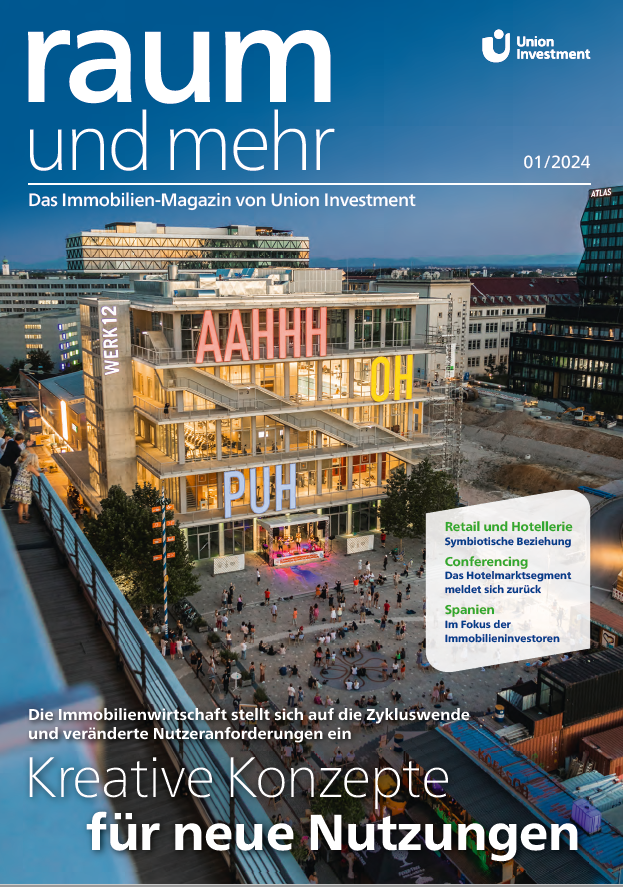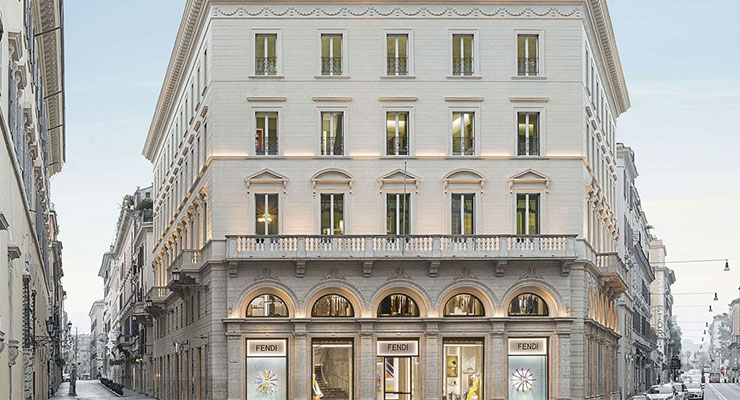by Sara Seddon Kilbinger
Tourism has gained a new momentum post-Covid and combining travelling with shopping has become increasingly popular. Retail tourism is playing a pivotal role in the recovery of the travel and tourism sector, which saw inbound tourism revenues surging by 82 percent in 2022, according to the World Travel & Tourism Council (WTTC). Shopping is no longer just a leisure activity; it shapes travel decisions, enhances destination appeal, boosts foreign exchange earnings and supports local brands and products. One emerging theme is “retailtainment” – the fusion of retail and entertainment – to incentivise shopping and enhance the customer experience.

“raum und mehr” (“places and spaces”) by Union Investment:
This is a preprint of the article in Union Investment’s real estate magazine “raum und mehr” (“places and spaces”). The author is Sara Seddon Kilbinger. Further content and all information about the magazine can be found here: https://realestate.union-investment.com/en_GB/magazine
Shopping tourism is establishing itself as a driving force in the travel industry
“Retail tourism is about more than buying souvenirs; it’s a driving force behind the recovery of the travel and tourism sector, contributing significantly to revenue, job creation and overall economic growth,” says Julia Simpson, WTTC President & CEO.
Andreas Siebert, Head of Retail Investment Germany at Cushman & Wakefield, agrees: “After the pandemic, people are enjoying travelling again,” he says. “Europe is a great destination for many international tourists, especially from the United States, because of the weak Euro, which is down by 10–15 percent compared to previous levels.” Siebert notes that more people are coming to Berlin, Munich and Düsseldorf, and footfall on the high street is now close to pre-pandemic levels.
In 2019, retail tourism represented a substantial US$178 billion, comprising 6 percent of the travel and tourism sector’s value, and even exceeding 15 percent in some destinations. The WTTC report underscores the merging of experiential tourism with shopping, meeting the demands of retail tourists. While high-street shops remain popular shopping destinations, out-of-town retail is also growing in popularity, with around one-third of survey respondents reporting visits to such destinations.
“We are now viewing these asset classes together in our new department,” says Andreas Löcher, Head of Investment Management Operational at Union Investment. “There are many successful alliances out there, such as between perfume and fashion, so why not hotels?”
Löcher points to the “positive symbiosis” between retail and hotels: “There are two layers – the retail tourism in cities such as Madrid and Barcelona, and the real estate itself.” Retailers and operators are looking at making better use of the space and service level for consumers, which can include adding hotel space. “I think this is also indicated by developers looking to mix the use,” he says. “In HafenCity in Hamburg, Unibail has developed a huge shopping mall with three hotels attached to it. This could also be induced by retailers – in the Ring Center in Berlin, there’s a great space at the top where they have added a fancy hotel. We have already seen great synergies in our mixed hotel-retail assets in Berlin Spandau Arcaden and Riem Arcaden in Munich, especially in the gastronomy and healthcare segments,” says Löcher. “If there is a retail opportunity in Germany, we’d be interested, assuming it’s also luring foreign tourists.”

“There are many successful alliances out there, such as between perfume and fashion, so why not hotels?”
Andreas Löcher, Head of Investment Management Operational, Union Investment
Hotel and event industry discover their own synergies
Retail tourism coupled with luxury hotel visits is enticing visitors to Germany and other European countries from far afield, according to Heidi Schmidtke, Managing Director, and Head of Operator Selection EMEA at JLL Hotels & Hospitality Group: “We are observing that many guests are coming from the Middle East and the Gulf States, who are seeking proximity to luxury retail brands, particularly in the luxury hotel sector, which means that the asset classes are essentially cross-fertilising each other,” she says. In addition, she notes, luxury brands are increasingly launching their own hotel brands in the market, such as Louis Vuitton, Bulgari, Christian Louboutin and others. “At the same time, we see links between hotel brands and the entertainment industry, which have developed products for the fans of their labels. The recent evolution of Taylor Swift concerts (including hotel deals) is just one example,” she adds.
Brands open their own hotels and integrate product sales
LVMH has just announced plans for a first Louis Vuitton hotel on Paris’s renowned Champs-Elysées. Fendi is offering private suites at the Fendi hotel in Rome and Dior now operates its Dior Spa Cheval Blanc at the Cheval Blanc hotel in Paris.
It’s a trend that is ricocheting out to other markets, according to Stefan Catic, Head of Operator Search at PFK Hospitality in Vienna: “What is very interesting is the mixed-use idea: how do hotels impact on retail and vice versa? Muji, for example, now has three hotels in Japan that incorporate their stores. This, for me, is the future; it could be done on a much larger scale, especially connecting fashion brands to hotel operators. Retailers could even deliver goods to your hotel room before you get there. The Marriott group has also signed three or four properties, including one in New York and one in Spain, where they will collaborate with fashion designer Wolfgang Joop.”
Patrick Adamle, Partner at mrp hotels, agrees that there are “even more far-reaching opportunities for closer cooperation”: “I think more retailers will enter the hotel space along the lines of Wolfgang Joop’s collaboration with Marriott in city and resort locations like New York and Milan,” he says. “Mainstream high-street brands, including fashion labels, could also adopt this approach. Furthermore, the concept of experience centres, like those developed by car brands such as BMW and Mercedes, offers an immersive and enjoyable experience. This trend represents a significant shift in how we perceive and integrate retail and hospitality and shows that it is not exclusive to luxury brands such as Bulgari and others.”
Retail giants like H&M and Zara Home entering the hotel sector would be “a unique opportunity to integrate their products directly into guest rooms, increasing the brand experience,” according to Adamle. “I’ve been exploring various fashion and lifestyle brands across Germany and Europe that could potentially establish their own hotel spaces,” he says. “The critical challenge lies in determining the asset’s ownership structure. Will it involve a joint venture, or will the brand operate the hotel independently, perhaps under a franchise model? Alternatively, is there scope for creating an entirely new hotel operator?”
Creativity is required, as many operational issues are still unresolved
However, for now, combining retail and hotels is still new to the market, according to Josef Filser, Head of Hospitality for the DACH region at Cushman & Wakefield: “It’s an operational question as to how to combine hotels and retail, a lot of new (hotel) developments are on hold, so people are putting a lot of creativity into maximising existing properties. Some owners have never dealt with hospitality before, it’s a new world, they need support, but they’re thinking outside the box.” He cites a flagship C&A store in Dortmund, which was acquired by developer Values Real Estate, who is now redeveloping it into a mixed-use scheme including retail as well as a hotel/serviced apartment concept.






